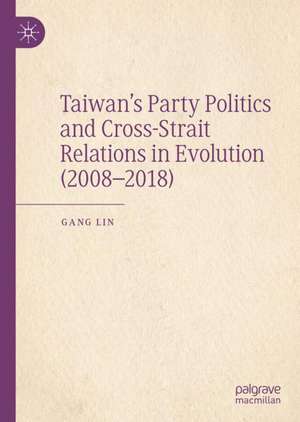Taiwan’s Party Politics and Cross-Strait Relations in Evolution (2008–2018)
Autor Gang Linen Limba Engleză Hardback – 12 mar 2019
Preț: 629.19 lei
Preț vechi: 740.23 lei
-15% Nou
Puncte Express: 944
Preț estimativ în valută:
120.40€ • 126.96$ • 100.23£
120.40€ • 126.96$ • 100.23£
Carte tipărită la comandă
Livrare economică 10-24 ianuarie 25
Preluare comenzi: 021 569.72.76
Specificații
ISBN-13: 9789811358135
ISBN-10: 9811358133
Pagini: 246
Ilustrații: X, 250 p. 12 illus.
Dimensiuni: 148 x 210 mm
Greutate: 0.47 kg
Ediția:1st ed. 2019
Editura: Springer Nature Singapore
Colecția Palgrave Macmillan
Locul publicării:Singapore, Singapore
ISBN-10: 9811358133
Pagini: 246
Ilustrații: X, 250 p. 12 illus.
Dimensiuni: 148 x 210 mm
Greutate: 0.47 kg
Ediția:1st ed. 2019
Editura: Springer Nature Singapore
Colecția Palgrave Macmillan
Locul publicării:Singapore, Singapore
Cuprins
1. Introduction.- 2. Dynamics of Party Politics in Taiwan.- 3. Politics of Identity in Taiwan.- 4. Taipei’s Policy Toward the Mainland.- 5. Beijing’s Policy Toward Taiwan.- 6. Political Economy of Cross-Strait Relations.- 7. Conclusion.
Notă biografică
Gang Lin is distinguished professor of political science and chairman of academic committee at Shanghai Jiao Tong University’s School of International and Public Affairs, director of Center for Taiwan Studies, member of the University’s Academic Committee, vice president of Shanghai Society for Taiwan Studies, and Senior Fellow of the Collaborative Innovation Center for Peaceful Development of cross-Strait Relations.
Textul de pe ultima copertă
This book explores the dynamics of party politics in Taiwan and cross-Strait relations over the past decade. While power transfer from the pro-independence Democratic Progressive Party (DPP) back to the pro-status quo Chinese Nationalist Party (Kuomintang, KMT) in 2008 ushered a great leap of cross-Strait relations in the following years, the DPP’s coming back to power in 2016 has reversed the trend and brought back a cold peace between the two sides of the Taiwan Strait featuring the period of the Chen Shui-bian administration. Social cleavage and partisan confrontation on the island have justified Beijing’s strategy of selective engagement with the two main parties within Taiwan. The state of cross-Strait relations, therefore, has become a by-product of volatile party politics on the island. As speculation about Taiwan's future mounts, this book will interest scholars, China-watchers, and policymakers.
Gang Lin is distinguished professorof political science and chairman of academic committee at the Shanghai Jiao Tong University’s School of International and Public Affairs, director of Center for Taiwan Studies, member of the University’s Academic Committee, vice president of Shanghai Society for Taiwan Studies, and Senior Fellow of the Collaborative Innovation Center for Peaceful Development of cross-Strait Relations.
Caracteristici
Summarizes political developments in Taiwan and its cross-Strait relationships Analyzes what domestic forces are at play in Taiwanese policy-making Offers a road map for the future of cross-Strait relations
